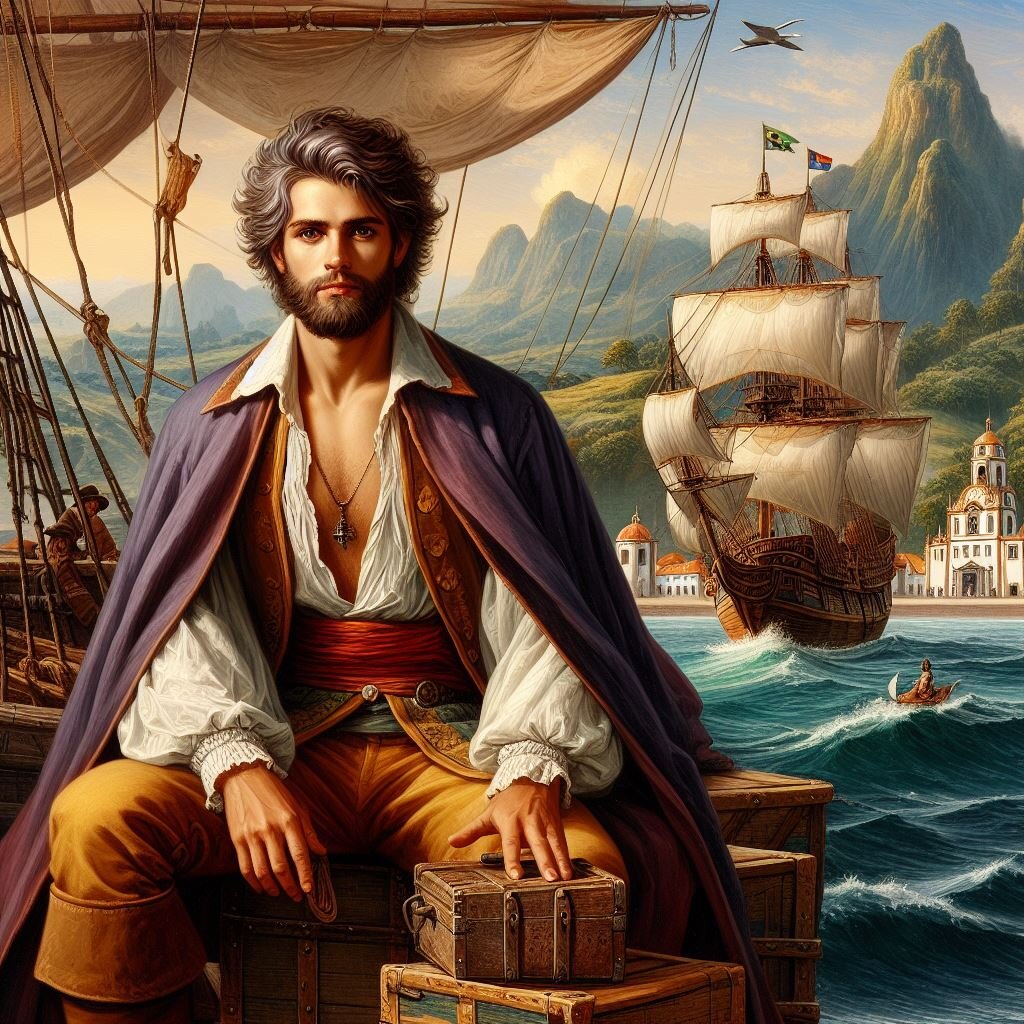Journey to the promised land (Brave Azorean People II)
Francisco finally received the king's long-awaited letter of reply to his request for permission to migrate to Brazil. He dreamed of joining the gold rush in which so many Portuguese had already made their fortunes. To do so, he had to settle in one of the well-established Portuguese colonies in the north or south-east of the country. However, the king, under the guidance of the Marquis of Pombal, had decided that the new waves of Portuguese emigrants should be settled in Desterro* and the Province of Rio Grande de São Pedro, in order to ensure that the southern region of Brazil remained under Portuguese rule. This was because Spain had been threatening to cross the natural boundary imposed by the Rio de la Plata, considered the southern border of the Portuguese colony, and occupy the unpopulated lands of the Rio Grande. Sending the Azoreans to Brazil would also help to reduce the revolt of the islanders, who had been abandoned to misery and hunger as a result of the recent droughts and tectonic catastrophes in the Azores.
In the letter sent, King João IV stipulated that Francisco would emigrate to Desterro and that his departure should take place by October 1748, in order to take advantage of the favorable winds for sailing in the Atlantic Ocean and the greater interest of the settlers in migrating at the end of the harvest season. Francisco, who could barely read and write and had no interest in studying, had no idea where Desterro was located or what the most important economic activities were in the region. But his need for change was so great that the king's response filled him with emotion and hope. His younger sister, Manuel and his father, who appeared in the courtyard attracted by Francisco's yelling, were stunned. The father had no idea of his youngest son's plans to go to Brazil.
The next day, when Manuel arrived at the manor house to discuss with Francisco how the employees would be distributed on the first day of the harvest, he was surprised by his childhood friend holding a bundle of clothes in his arms. "Here, Manuel. Take these clothes. They're in good condition, but I can't take them with me because my luggage is already too bulky. The rest of my clothes, shoes and shaving gear I'm going to sell so I can pay off my debts before I leave. From now on I'll be a distinguished bearded man!". The two of them burst into laughter and ended up exchanging hugs and friendly slaps on the back, thrilled that they were about to say goodbye. Manuel received his present with joy, as his clothes were already in a very bad state. The night before, Francisco had hardly slept at all. He had spent the whole time sorting out his belongings to take to Brazil and making plans for his future wealth.
When the day of the trip finally arrived, Francisco had to go to the parish of Horta, on the island of Faial. There he would board the galley that would take him to Brazil. His parents and sister took the same boat to Horta so that they could be present at the port to say goodbye. As the journey was very dangerous and Brazil was on the other side of the world, they didn't know if they would ever see each other again. "Francisco, my son, find yourself a good wife, a daughter of Portuguese people like us. Give her the jewels I gave you. You don't know how sad it makes me to know that I won't get to know my grandchildren, but always tell them about us and send me a cameo with their portraits painted on it when you can. Don't ever forget us, because we'll always be thinking of you. Every night I will say a prayer to God, asking that you be happy, healthy and successful all the days of your life. Go with God, my son".
Francisco finally boarded the ship. He felt both excited and afraid. The ship seemed so small and fragile! How could she carry all those people for two months? But he could still consider himself lucky: as he came from a noble family, he would be sharing a cabin with the ship's captain. The other emigrants and their bundles would be crammed into large, stuffy chambers that weren't adapted for transporting passengers. The galleys that would take them to the colony were generally used to transport grain, wood, wine and other goods.
The Atlantic crossing ended up taking three months, as the winds were not as favorable as expected. In the meantime, Francisco thought he was going to go mad. "If I'd known the voyage was going to be like this, I wouldn't have come!" he said to the young nobleman who had become his friend and who spent hours on deck beside him, grieving at the sight of a sea as calm as a lake. The other men traveled in the hold chambers, lying next to those who were on the verge of death, suffering from scurvy or intestinal infections contracted from the contaminated water and the lack of hygiene on the ship. The filth and smell of the ship were unbearable, as there weren't even potties for them to go to. The women and children came in separate chambers from the men. In order for them to see their husbands or brothers, the ship's captain had to give permission.
By the end of the journey, a considerable number of the passengers had died. The captain cared little about this, as the cost of transportation had already been paid for by the Portuguese crown when the passengers boarded, and the greater the number of deaths, the more room there was on the ship for those who survived. When the passengers began to see the coast of Brazil and the puffins flew curiously over the ship, a rumor left the passengers desperate. A gossip had started circulating on the ship that some crews used to sink the galleys they were traveling in before they docked at the port of destination, with the aim of looting the goods of the passengers, who were taking everything of value with them to the colony. Desperate, the women spent hours on end sewing their jewelry and coins into the hem of their skirts, so that at least this would not be lost. But the landing was safe.
Francisco, who was an excellent swimmer and an optimist by nature, considered the whole shipwreck story to be an invention of fearful women. The ship was due to arrive at the port of Desterro in the morning of the following day. That night, Francisco couldn't sleep, as the anticipation was enormous. When it was almost dawn, he gave up trying to sleep and went up on deck. With his eyes red from lack of rest and his fingers firmly gripping the balustrade, he watched as the sun rose, shoals of whales parading peacefully in the sea off the coast accompanied by their calves, while the males distracted the sailors' attention by slapping their tails against the water and forming clouds of bubbles.
When the shoals disappeared over the horizon, Francisco and his friend closed their eyes to better visualize their dreams, and showed their faces to the warm wind blowing from the mainland to the sea. Soon they would be disembarking in the promised land.
The confusion at disembarkation was immense. Crown officials came to ask the immigrants to be patient, as they would soon be sent to their new land. In addition to the land, the king promised to donate some cattle, seeds and tools. But for the time being, some of them would be accommodated in the homes of local residents, while the majority would be put on a new ship that would leave the next day for the Province of Rio Grande de São Pedro. The news caused outrage among the Portuguese, as they were exhausted after the long voyage, and considered that a new voyage by ship to Rio Grande meant an additional risk to their lives.
Francisco and the other noblemen on the ship were quickly transported to the homes of wealthy families of Azorean and Madeiran origin settled in the region, who would gladly host these illustrious visitors. He would then be able to rest from the long and tiring journey he had made and recover with the help of the care provided by his hosts' slaves. In addition, it would be an excellent time for them to learn a little about the politics of the colonies and integrate into local society. Francisco would be staying with the Ferreira de Melo family, a very prestigious family from Terceira Island in the Azores.
On arriving at his temporary home, Francisco noticed a beautiful girl covertly examining him from behind a lacy curtain. "Later you'll be able to satisfy your curiosity about this beautiful specimen, my dear. For now I just want to take a nice hot bath, rest and put on some clean clothes."
*Desterro was the name of the region where the city of Florianópolis now stands.
Voltar

